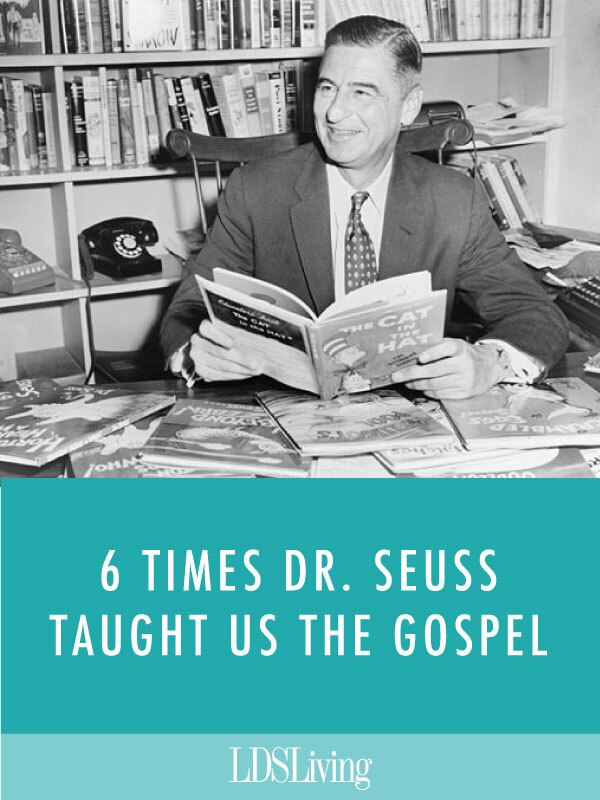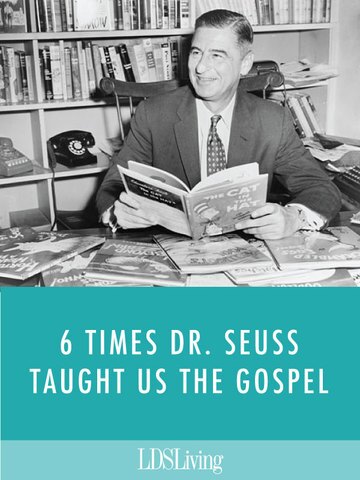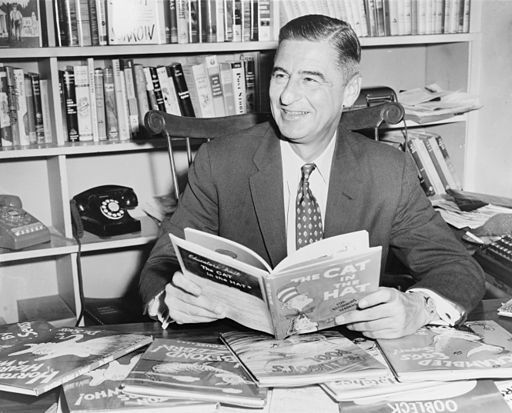
His words make us giggle, his words make us cry. There's no place for doubt, he's one terrific guy. But whether you're a Who or a Jiggle Micpuff, his words mean much more than the regular stuff. They help us to see worlds out way far into space and remind us of principles from a heavenly place. So, we hope you enjoy and we hope you will grow from that famous Dr. Seuss who says much more than you know.
In How the Grinch Stole Christmas
The Grinch in How the Grinch Stole Christmas is a prime example of someone having his heart set on earthly treasures, as we phrase it in the scriptures. But when he sneaks into the village of Whoville and takes all of the presents, decorations, and toys that he thinks make the Whos happy, he learns that their happiness comes from somewhere deeper:
"Maybe Christmas," he thought, "doesn't come from a store."
"Maybe Christmas...perhaps...means a little bit more!"
And what happened then? Well...in Whoville they say,
That the Grinch's small heart grew three sizes that day!”
If Dr. Seuss were our Sunday School teacher, we're sure he would use the Grinch to point out that earthly possessions are not what makes us happy in life. We are reminded in Matthew that “For where your treasure is, there will your heart be also.” And likewise in D&C 130, we are reminded that “Whatever principle of intelligence we attain unto in this life, it will rise with us in the resurrection. And if a person gains more knowledge and intelligence in this life through his diligence and obedience than another, he will have so much the advantage in the world to come.”
Let’s remember the lesson the Grinch learned and be careful how we arrange our priorities.
Through Thidwick the Moose
Thidwick the Big-Hearted Moose tells the story of a moose who is too big-hearted to say no. It begins with Thidwick roaming around Lake Winna-Bango when a bug lands on his antlers and asks for ride. Thidwick allows the bug to stay, but the bug soon invites a tree spider, a Zinna-zo bird, the Zinna-zo bird’s wife, a woodpecker, Herman the squirrel and his family, a bobcat, a turtle, a fox, and their fleas, a bear, and 362 bees to join. Soon, Thidwick is carrying an awful weight and being chased by hunters, all because he couldn’t say no to the bug.
"But I’m a good sport, so I’ll just let him rest,
For a host, above all, must be nice to his guest.”
It can be easy to accept a task when it's so small and insignificant. Soon, though, we can find ourselves overburdened with not only our own struggles, but the struggles of others because we are seeking to be helpful. Always remember that we, like Thidwick, can shed ourselves of our burdens and place them on the Lord.
The Savior invites us to "Come unto me, all ye that labour and are heavy laden, and I will give you rest. Take my yoke upon you, and learn of me; for I am meek and lowly in heart: and ye shall find rest unto your souls. For my yoke is easy, and my burden is light" (Matt. 11:28-30).
We can always keep ourselves big-hearted and strive to help others; we just need to remember that we don't have to keep our burdens and struggles all to ourselves.
With the Story of the Sneetches
Most of us are familiar with the scripture from 1 Samuel 16:7, "Look not on his countenance, or on the height of his stature; because I have refused him: for the Lord seeth not as man seeth; for man looketh on the outward appearance, but the Lord looketh on the heart." Though it isn't put exactly that way in The Sneetches, the creatures in the book also learn the value of not judging others by their appearance. Sneetches with stars on their bellies look down on the Sneetches without them. But when a man comes with a magic machine that makes and removes stars, all of the Sneetches quickly realize that they can't keep up to each other and that the stars are not important after all:
“I'm quite happy to say
That the Sneetches got really quite smart on that day,
The day they decided that Sneetches are Sneetches
And no kind of Sneetch is the best on the beaches.
That day, all the Sneetches forgot about stars
And whether they had one, or not, upon thars.”
Just like the Sneetches, we need to remember that the Lord doesn’t love one of us more than another. We are each unique, and part of our responsibility on earth is to learn charity. In fact, President Uchtdorf reminded us in October 2009 general conference that “God does not look on the outward appearance. I believe that He doesn’t care one bit if we live in a castle or a cottage, if we are handsome or homely, if we are famous or forgotten. Though we are incomplete, God loves us completely. Though we are imperfect, He loves us perfectly. Though we may feel lost and without compass, God’s love encompasses us completely.” As we strive to remember this, each of us, like the Sneetches, can learn to live peacefully with those around us.
With the Littlest Who
In Horton Hears a Who, the tiny Whos reminds us that the Lord can make small things become great.
When Horton the elephant finds an entire world on a speck of dust, he wants to find a safe place for the speck and its tiny residents. However, he is quickly ridiculed by his friends who don’t believe the tiny Whos on the speck actually exist. In order to save their home and prove that their elephant protector is not crazy, all of the Whos make as much noise as they can, but it is not until the littlest Who yells “Yopp!” that the other animals hear them and believe Horton:
“And that Yopp… That one small extra Yopp put it over! Finally, at last! From that speck on that clover their voices were heard! They rang out clear and clean. And the elephant smiled.
“Do you see what I mean?... They’ve proved they ARE persons, not matter how small. And their whole world was saved by the Smallest of ALL!”
Horton’s observations sound remarkably similar to a scripture in Alma 37: 6-7.
“Now ye may suppose that this is foolishness in me; but behold I say unto you, that by small and simple things are great things brought to pass; and small means in many instances doth confound the wise.
"And the Lord God doth work by means to bring about his great and eternal purposes; and by very small means the Lord doth confound the wise and bringeth about the salvation of many souls.”
The Lord knows each one of us and He hears us, no matter how small and unrecognized we feel. He knows our individual potential, and if we are humble and willing, He can use us to bless His children and change lives, just like the littlest Who.
In Horton Hatches the Egg
The loveable elephant in Horton Hatches the Egg teaches us a valuable gospel lesson about faith. In this story, Maisy, a lazy bird, is tired of sitting on her egg, so she entreats a passing stranger, Horton, to sit on her egg and keep it warm while she flies off for a quick break. Soon, Maisy finds she likes her time flying free and decides not to go back. In the meantime, Horton is ridiculed, endures the cold and storms, and even gets taken across the sea to be a sideshow in the circus. But through it all, he remains faithful. “I meant what I said, and I said what I meant. An elephant's faithful one-hundred percent,” says Horton.
These words remind us of a similar stalwart soul, Nephi, when he tells his father, “I will go and do the things which the Lord hath commanded, for I know that the Lord giveth no commandments unto the children of men, save he shall prepare a way for them that they may accomplish the thing which he commandeth them” (1 Nephi 3:7).
Through Yertle the Turtle
“Yertle the turtle was king of the pond, a nice little pond. It was clean it was neat, the water was warm, there was plenty to eat.
"Until one day the king of them all decided the kingdom he ruled was too small. ‘I'm a ruler of all that I see, but I don't see enough’. . .
"So Yertle the turtle king lifted his hand, he ordered all the turtles onto one another's back. He piled them high into a ten turtle stack.”
I bet you can anticipate what happens next in this story from Dr. Suess's Yertle the Turtle. Yertle forces many of his turtle subjects to pile high beneath him, but he is never satisfied and always desires to see further and climb higher. Things don’t end well for our friend Yertle, who ends up losing his kingdom. Much like the people in the tower of Babel, Yertle eventually sees the havoc his pride created. This story also acts as a parallel to the tower in Lehi's dream:
“And I beheld that they were in a large and spacious building . . . and it came to pass that I saw and bear record, that the great and spacious building was the pride of the world; and it fell, and the fall thereof was exceedingly great. And the angel of the Lord spake unto me again, saying: Thus shall be the destruction of all nations, kindreds, tongues, and people, that shall fight against the twelve apostles of the Lamb” (1 Nephi 11: 35-36).
BONUS:
Oh the Places You'll Go
Though this story doesn't have a specific character that teaches us a lesson, it has a message that echoes several principles we teach in the gospel:
“You have brains in your head.
You have feet in your shoes.
You can steer yourself
any direction you choose."
Isn’t this true? President Nelson, in an October 2013 general conference talk entitled “Decisions for Eternity,” explains, “The wise use of your freedom to make your own decisions is crucial to your spiritual growth, now and for eternity. You are never too young to learn, never too old to change. Your yearnings to learn and change come from a divinely instilled striving for eternal progression. Each day brings opportunity for decisions for eternity.”
Sometimes our choices are not always correct, however. And Dr. Seuss reminds us of that with the lines:
"So be sure when you step.
Step with care and great tact
and remember that Life's
a Great Balancing Act.
Just never forget to be dexterous and deft.
And never mix up your right foot with your left."
That sounds pretty similar to something that Lehi saw in his vision of the tree of life, when “many were lost from his view, wandering in strange roads.” We all have the gift of agency to make our own decisions, but God knew we were going to make mistakes. He gave us repentance to help us be able to return to Him despite “mixing up our right and left feet” sometimes. Like the hope of the gospel, Dr. Seuss gives readers that hope as well in some of the closing lines of the book:
“And will you succeed?
Yes! You will, indeed!
(98 and 3/4 percent guaranteed.)
KID, YOU'LL MOVE MOUNTAINS!”
Dr. Seuss probably didn't realize that he was using a line almost straight out of scripture—a promise the Lord has made us as well. We just need to have the faith to move forward in our righteous decisions, correcting our paths when necessary and always relying on the Lord:
“If ye have faith as a grain of mustard seed, ye shall say unto this mountain, Remove hence to yonder place; and it shall remove; and nothing shall be impossible unto you.” (Matthew 17:20)
Lead image of Dr. Seuss from Wikimedia Commons
What other gospel lessons have you learned or taught your children from Dr. Seuss? Share them below!


